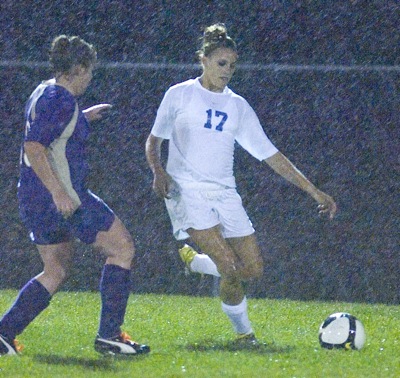Thursday, October 16th, 2008
Coldwater mother helps fill a need
By Jean Giesige
Bernard and Mary Siefring of Coldwater already had three girls when their daughter Paula came along in 1962, so they knew what to expect with a toddler. They weren't seeing it with Paula.
"I had tried to convince myself that everything was okay, but by the time she was 3 I knew there was something wrong," Mary said. "I knew I had to take the bull by the horns myself."
Their family doctor directed the Siefrings to a hospital in Cincinnati where they received the diagnosis, in the terms of the day, that Paula was mildly retarded.
"They said they would see what services were available in my area and get back with me," she said. "I never heard from them again."
As Paula grew, Mary learned that their local school district had no programs to offer to help her.
"I even wrote a letter to the editor of the local newspaper, my first letter to the editor, saying that something needed to be done to identify these kids before they reached school age. It wasn't right that parents had to do everything on their own," she said.
Once again, she had to be her daughter's guide, protector and advocate.
"I took her by the hand and we walked into Cheryl Ann School," then located on the Mercer County fairground. Finally, Mary had found a place where Paula could get some help.
To this day, the Siefrings are part of the Cheryl Ann family. Paula, now 45, sets off for the Cheryl Ann workshop every weekday. Through the years Mary has been an active volunteer and a tireless advocate for people with developmental delays. For her commitment to the program, she has received the third annual Albert Heckler Award from Cheryl Ann Programs. The award is given to a family member who shows unique and enduring dedication to Cheryl Ann Programs and the people it serves.
Raising a child with developmental delays, even with the help of Cheryl Ann, wasn't easy. The Siefrings had plenty of other commitments to keep them busy. They went on to have three more girls after Paula, and they operated a family farm. Mary volunteered at her other children's school, so she saw no reason not to dive into volunteer activities at Cheryl Ann.
She joined the Council for Retarded Children (which later became ARC) and eventually served two terms as president, then many terms as treasurer.
"We volunteered at the school, we ran bake sales and rummage sales," she said. "My husband and I sponsored dances as fundraisers for many years. We built floats for local parades."
It was all part of Mary's philosophy to look a situation squarely in the eyes, then see what she could do to help make things better.
"I always figured you can't get rid of a problem until you face it," she said.
Having a child with special needs changed the family in a profound way. Paula's needs were always a consideration, always on the family's mind. Mary, who is still researching, now believes that Paula shows many symptoms of autism. As difficult as it was at times, it also strengthened them, Mary said.
"My girls all grew up able to handle anything that came their way," said Mary, who now has 17 grandchildren.
In the 1990s, Mary served on the MR/DD board. She is typically modest about her contributions. "I warmed a chair," she said.
But Mike Overman, the superintendent of Cheryl Ann Programs, said that Mary's contributions were invaluable.
"We like to think that we offer a lot to families like the Siefrings. But volunteers like Mary offer so much to us," Overman said. "She has given us years of her hard work, insight and dedication. We're happy to be able to recognize her many contributions and we hope that her story will encourage others to get involved."
